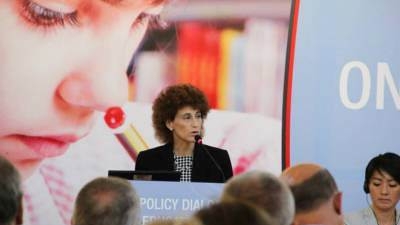Policy Dialogue on Education Reform in Albania
TIRANA, September 17, 2014 – A Policy Dialogue on Education Reforms was held yesterday in Tirana, organized by the Ministry of Education and Sports in cooperation with the World Bank. This event offered an important opportunity to discuss the findings of several World Bank analytic reports, take stock of recent reforms undertaken by the government, and identify priorities for moving forward. Participants in the event included the Prime Minister Edi Rama, the World Bank Country Director for Southeast Europe Ellen Goldstein, Minister of Education and Sports Lindita Nikolla, World Bank Country Manager for Albania Tahseen Sayed, representatives from public and private universities and other education institutions, representatives from the development partners, and education experts.
The policy dialogue highlighted optimizing skills development through a lifecycle approach to learning, rising quality of education, and closing the gaps in student performance. World Bank education experts presented the findings from the latest Programme for International Student Assessment (PISA) Report, the Albania Early Childhood Development-Systemic Approach for Better Education Results (SABER) Report, as well as the education chapter from the Public Finance Review.
In the currently constrained fiscal environment Albania spends less than the regional average per capita on education, but there are still opportunities to improve the efficiency of education spending and explore additional resources.
“We are working in very close cooperation with the World Bank, other international institutions, and EU, within the framework of the Western Balkans Initiative, to include education sector in their programs, so that we can ensure increased financing for education” said the Prime Minister Edi Rama.
The World Bank experts expressed support for the preprimary education reforms undertaken by the Government, while noting examples of good practice based on global evidence. The Ministry of Education and Sports unveiled its plans to improve access to and enhance the quality of preprimary education over the next four years as well as presented progress on higher education reforms.
“Investing in early childhood development is key for long-term and sustainable success, said Minister of Education and Sports, Lindita Nikolla. “This means that early foundational skills allow for long learning and adapting to the constantly evolving demands of the labor market.”
Data show that Albania has made major progress in expanding access to education in the past decade, but still significant disparities persist in access by low income groups, particular for pre-primary and tertiary education. While PISA results improved between 2000 and 2012, overall performance remains low and significant disparities in learning outcomes remain a concern between low-income and higher-income students, between rural and urban schools, and between boys and girls. Recent reforms to improve quality assurance mechanisms in higher education are encouraging, and the next steps are to enhance the relevance while strengthening linkages with the private sector.
“If Albania is to compete in sophisticated global product and service markets, it needs to improve the quality and productivity of human capital which are critical to both short-term and longer-term prospects for inclusive growth and increased employment in Albania”, said Ellen Goldstein, World Bank Country Director for South East Europe.

